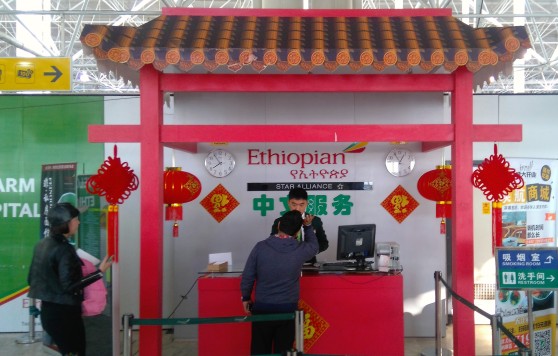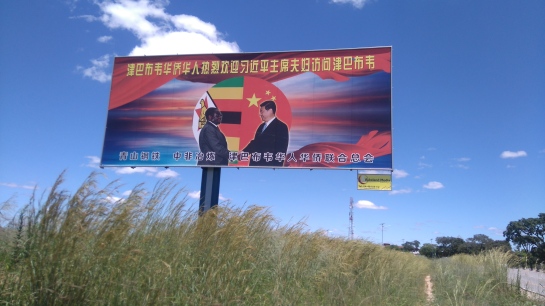– Wadeisor Rukato
Part 1: Nairobi, Addis Ababa, Harare
This post is the first in a three-part series that reflects on Chinese migration to Africa. This is a slight switch up from our usual reflections on our experiences in China. I begin by sharing my experiences of ‘the interaction between China and Africa’ in my recent visits to Nairobi and Harare. The two posts that follow in this series will respectively focus on Chinese migration to Africa from a historical perspective, and a broad typology of Chinese migrants who have moved to the continent. An analysis of China-Africa relations through the complexities of migration brings a much needed human aspect to the forefront of a dynamic that is too often discussed in terms of billions of dollars and signed agreements.
During the just-ended winter vacation, I took a trip to both Nairobi and Harare. When I left South Africa in August 2015, I had not expected that I would visit home or a country in Africa until I had spent at least one year in China. Having just arrived back in Beijing, I am grateful for my travels back because I was able to practically engage with some of the things I had learned about China’s relations with African countries.
Less than a week into my arrival in Nairobi, I had met at least five students from across China who were in Kenya on exchanges through AIESEC. I was immediately excited by the opportunity to practice my very basic Chinese and share snippets of my experience in China with people who would know exactly what I was talking about. That same week, I was disappointed in myself as I failed to recognise the Chinese characters on the perimeter of a construction site at the University of Nairobi, where it appeared that new buildings were being erected.
In my second week in Nairobi, I met with the CEO and founder of a social enterprise operating from Nairobi called China House. It was a fascinating experience, in which I learned about the work that China House does in Nairobi to help Chinese companies to operate in compliance with local regulations, to enable young Chinese people to learn more about Africa through an experience in Kenya, and to tackle Chinese perceptions toward wild life conservation (in Africa).
As I left Nairobi for Harare, I was newly aware of the flows of Chinese travellers I saw at Jomo Kenyatta International Airport. I flew Ethiopian airways and as I rushed through Bole International Airport to catch my connecting flight I stopped dead in my tracks when I saw an information booth wreathed in Chinese New Year decorations.
I pulled out my cell phone to take pictures before approaching the booth. “Excuse me, can you tell me why this booth is specifically adorned in Chinese New Year decorations?” The question I asked the Chinese airport attendant behind the booth. His response was that Chinese New Year was a few days away. I already knew this, so I remained put because my question had not been answered.
At this point an Ethiopian airport manager approached us and asked if there was an issue. I repeated my question to her and she let me know that the special information booth had been erected in order to address queries from the numerous Chinese travellers who flew through Bole International. She also let me know that non-Chinese travellers were free to make inquiries at the special booth too.

Ethiopian Airways has four routes to China, the most recent being its flight to Hangzhou. In the last week of January 2016, in honour of its Chinese customers, the airline hired special chefs to prepare dumplings for all Chinese nationals returning home for the Spring Festival. This was done under the theme of “Ethiopian Airlines taking you home”. Had I been aware of this already, I would not have been so intrigued by the information booth.
I observed another interesting interaction between China and Africa a week into my time in Harare when my mother and I excitedly drove to Harare International Airport to fetch my sister who had landed in Zimbabwe. About a kilometre before reaching the airport, we drove past two massive billboards that made me nearly make my mother turn the car around. They are pictured below.


The second of the two billboards is completely in Chinese and, having seen it, I launched into a mild rant to my mother about how ridiculous this was because a vast majority of Zimbabweans would have no clue what the billboard said! In calming me down she explained to me how the billboards had in fact been put up at the time of president Xi Jinping’s visit to Zimbabwe almost three months ago, in December 2015. It was simply diplomatic protocol to have acknowledged the state visit and put up signs that welcomed China into the country. The billboards were just one of the numerous ways through which Zimbabwe’s hospitality was demonstrated. A symbol of Zimbabwe’s friendship with China. Just another mild reminder of the ways in which the complex interactions between China and African countries changing the faces of cities across the continent.


I’m first reaction is worry. The las people who came to Africa wanting to trade took our land riches and population. Are we allowing this to happen for money. Has Africanot learnt anything
LikeLike
Hi Angela, thank you for visiting fromAfricatoChina. You have touched on a sentiment that is indeed widely shared; many people are asking these questions, and rightly so. On this, I think it is important to go beyond the narratives of China as a neo-colonialist, which can be considerably biased, and tease out the complexities of the relations. Here is some introductory reading on this topic (http://www.brookings.edu/blogs/africa-in-focus/posts/2015/11/05-chinese-land-grab-africa-sy)
– Wadeisor Rukato
LikeLike